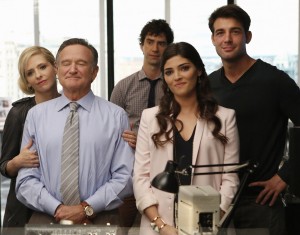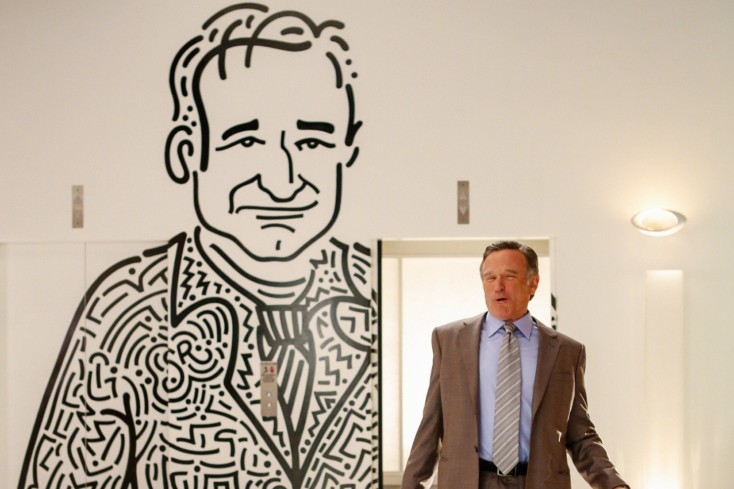
(L-R) Sydney Roberts (Sarah Michelle Gellar), Simon Roberts (Robin Williams), Andrew Keaneally (Hamish Linklater), Lauren Slotsky (Amanda Setton) and Zach Cropper (James Wolk) are setting the advertising world on fire on the series premiere of “THE CRAZY ONES.” ©CBS Broadcasting. CR: Cliff Lipson.
By ANGELA DAWSON
Front Row Features
HOLLYWOOD—More than three decades after he crash landed a space ship on “Mork & Mindy,” launching a meteoric career, Robin Williams returns to the small screen in the new TV series “The Crazy Ones.”
This time around, Williams, who went on to become both a serious (“Good Will Hunting,” for which he won an Academy Award for Best Supporting Actor) and comedic movie star (“Mrs. Doubtfire,” “The Birdcage”), plays a very human and funny father. The sit-com, produced by David E. Kelley, premieres on CBS Thursday, Sept. 26 at 9/8c.
The 62-year-old funnyman recently spoke at the Paley Center in Beverly Hills to talk up his new series, in which he plays an ad man who runs a boutique Chicago agency with his daughter, played by Sarah Michelle Gellar.
Q: What can you tell us about “The Crazy Ones?”
Williams: It’s a father-daughter ad agency in Chicago. We are micro firm with high-end clients. I’m the idea guy, who has led a very interesting life, multiple wives, rehab. Hey, sound familiar? Sarah Michelle plays my daughter and we’re trying to keep this agency topical in the media.
Q: What’s the story behind you doing another TV series? Did you pitch them or did they pitch to you?
Williams: I was told that David Kelley wanted to meet with me so I sat down with him in San Francisco. He told me he had this idea for a series. He’s an interesting guy. He doesn’t laugh very much. I thought this is worth taking a shot. It’s a one-camera show with no audience so they shoot it like a movie. It reminds me of these old ‘40s screwball comedies. The dialogue plays so fast that sometimes they have to add more pages to the script as we’re talking so fast, which is so cool. I was in right away.
Q: Often actors can disappear working with you …
Williams: Oh no they don’t at all. The people that I’m working with like Hamish Linklater, James Wolk, Sarah and Amanda (Setton) are a great cast of people who are as equally as funny. They can riff too so the pressure is off on that level, which is so great. Even the ad campaign (for the show) isn’t just me. It’s an agency and there are lots of other characters. They are building this rhythm around that. And that is so freeing. Television is built around that. These are characters people can relate to which is so exciting. We all have this idea of let’s make it work.
Q: When you were growing up, what TV shows did you watch?
Williams: One of the best shows I ever saw as a boy was one I watched with my dad, who was not the easiest laugh in the world. It was “The Tonight Show” with Jack Paar and Jonathan (Winters) came on wearing a pith helmet. Jack said, “What are you?” And Jonathan replied, “I’m a great white hunter.” He said, “What do you hunt?” He said, “I hunt mainly squirrels.” He said, “How do you do that?” He said, “I aim for their little nuts.” And I saw my dad just fall out of his chair, and I looked at the TV and went, “Who is this man?” After I saw (Winters) do that, I thought “Whoa,” and the fact that he made my dad laugh, that was the beginning for me.
Q: Was that when you knew you wanted to do comedy?
Williams: Jonathan planted a seed that didn’t take root until high school. I could make my mother laugh sometimes because I could do a pretty dead-on impression of my grandmother, whom I never met. That was another therapeutic moment.
Q: Do you remember your first time on TV?
Williams: Yeah, I was on a remake of “Laugh-In.” My favorite moment on that was that I got to meet Frank Sinatra which, if you don’t make him laugh, (he makes a slicing motion across his throat). When he laughed at my joke, I thought, “I’m going to live another day!!” That was pretty crazy.
Q: How did your guest shot on “Happy Days” where you introduced the world to Mork from Ork come about?
Williams: The rumor was, and I don’t know if this is true that (“Happy Days” producer) Garry Marshall’s kid had seen “Star Wars,” and he came to his dad and said, “Why can’t there be an alien on ‘Happy Days?’”
Q: “Mork & Mindy” turned you into a rock star, right?
Williams: The first taping was pretty crazy. The first audience was going too well. Everyone was laughing all the time and finally the director said, “What’s going on?” And the director’s assistant went to have a look at the audience and went, “Whoa!” It turned out we had an entire audience of mental patients. They had gone to a mental institution and said, “You want to see a show?” Then they went out and got another audience 15 minutes later.
Q: What comedians influenced you the most?
Williams: It’s between Peter Sellers and Jonathan Winters. Jonathan would just do amazing things. You would see him on shows and think, “How did he do that? “His wife had the best quote, she said, “Most men have their terrible twos. Jonathan’s lasted 20 years.” He was an interesting guy to hang out with. I once saw him park in a handicap parking space and he had a handicapped sticker and this woman came up to him and said, “You don’t look handicapped.” And he said, “Not if you can see inside my mind.”
Q: Are you still recognized as Mork?
Williams: Oh yeah, all over the world. I think it’s because (the show) had its initial life, and then it was on Nickelodeon. It got into people’s deep wiring. People still come up to me and say “nano nano” and “shazbot.” After I won the Academy Award it was interesting. For a week afterward, it was like, “Congrats on the award.” A month later it was: “Mork!”
Q: Where does your humor come from? Was anyone in your family that sharp-witted?
Williams: My mother was really funny. She had this whole thing when she would take a rubber band, cut it and stick it up her nose and she’d be at a cocktail party with my dad surrounded by all of these WASP-y people and she would pretend to sneeze in mid-conversation. At that point, my dad is going: “That’s my wife.” That kind of stuff registered with me later. The first real comedy show I did was in high school where I got to make fun of the teachers. I could do a pretty dead-on impression of this one teacher who I think took a lot of acid and taught high school. I think he taught civil war in a group hug. My impression got a big laugh and that was the first time girls started to notice me. It was this idea of using humor as a good way to meet ladies and that was how the idea started to build for me. Here is where the improvisation really started for me. I went to an all-men’s college called Claremont College. I was studying political science and economics. You think the economy is bad now? The only place where the women were was in the improvisational theater class. I ended up taking improvisational theater class to be with the women.





